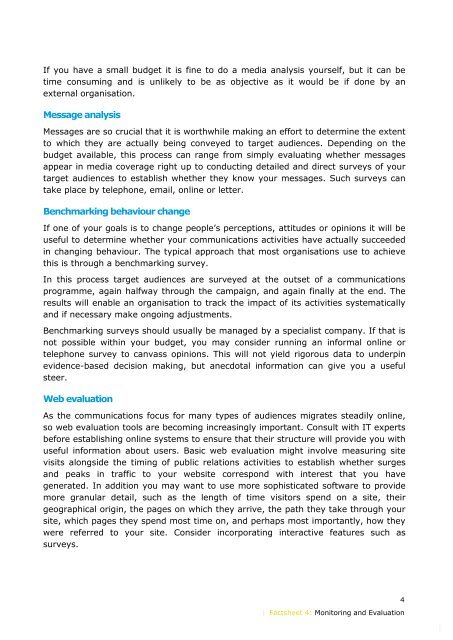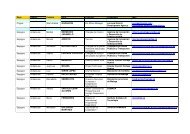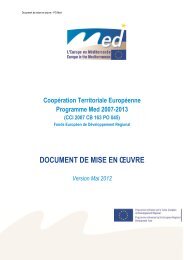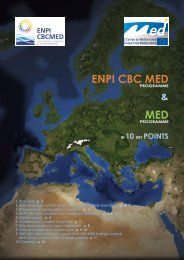MED Communication Handbook - Programme Med
MED Communication Handbook - Programme Med
MED Communication Handbook - Programme Med
You also want an ePaper? Increase the reach of your titles
YUMPU automatically turns print PDFs into web optimized ePapers that Google loves.
If you have a small budget it is fine to do a media analysis yourself, but it can be<br />
time consuming and is unlikely to be as objective as it would be if done by an<br />
external organisation.<br />
Message analysis<br />
Messages are so crucial that it is worthwhile making an effort to determine the extent<br />
to which they are actually being conveyed to target audiences. Depending on the<br />
budget available, this process can range from simply evaluating whether messages<br />
appear in media coverage right up to conducting detailed and direct surveys of your<br />
target audiences to establish whether they know your messages. Such surveys can<br />
take place by telephone, email, online or letter.<br />
Benchmarking behaviour change<br />
If one of your goals is to change people’s perceptions, attitudes or opinions it will be<br />
useful to determine whether your communications activities have actually succeeded<br />
in changing behaviour. The typical approach that most organisations use to achieve<br />
this is through a benchmarking survey.<br />
In this process target audiences are surveyed at the outset of a communications<br />
programme, again halfway through the campaign, and again finally at the end. The<br />
results will enable an organisation to track the impact of its activities systematically<br />
and if necessary make ongoing adjustments.<br />
Benchmarking surveys should usually be managed by a specialist company. If that is<br />
not possible within your budget, you may consider running an informal online or<br />
telephone survey to canvass opinions. This will not yield rigorous data to underpin<br />
evidence-based decision making, but anecdotal information can give you a useful<br />
steer.<br />
Web evaluation<br />
As the communications focus for many types of audiences migrates steadily online,<br />
so web evaluation tools are becoming increasingly important. Consult with IT experts<br />
before establishing online systems to ensure that their structure will provide you with<br />
useful information about users. Basic web evaluation might involve measuring site<br />
visits alongside the timing of public relations activities to establish whether surges<br />
and peaks in traffic to your website correspond with interest that you have<br />
generated. In addition you may want to use more sophisticated software to provide<br />
more granular detail, such as the length of time visitors spend on a site, their<br />
geographical origin, the pages on which they arrive, the path they take through your<br />
site, which pages they spend most time on, and perhaps most importantly, how they<br />
were referred to your site. Consider incorporating interactive features such as<br />
surveys.<br />
� Factsheet 4: Monitoring and Evaluation<br />
4<br />
�








